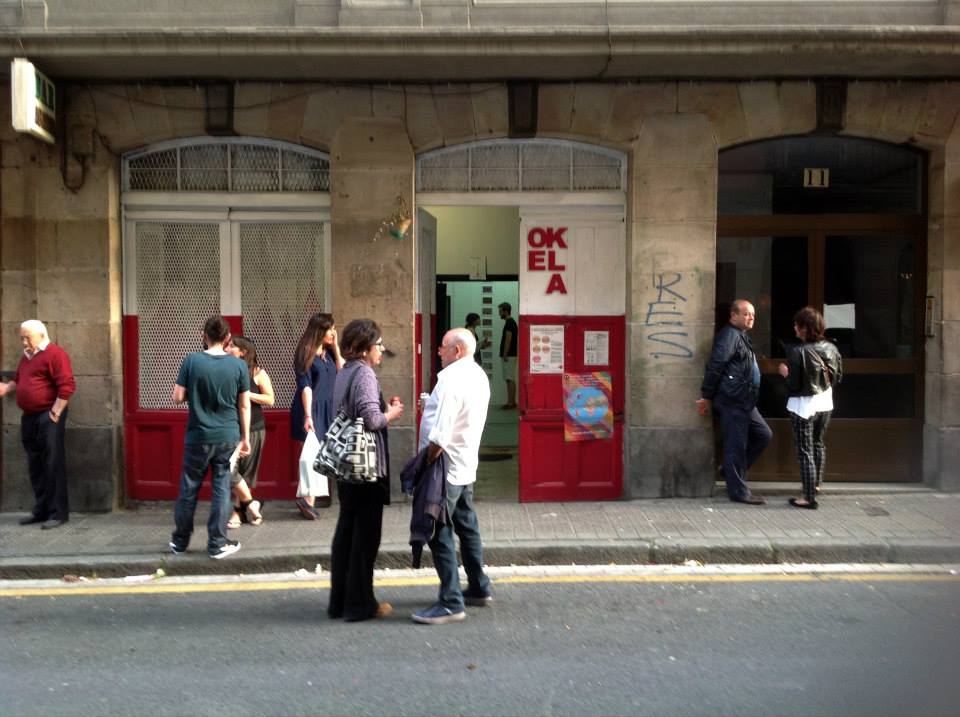
- The creators Izaro González Ieregi, Nora Aurrekoetxea and Irati Urrestarazu will take a look at the space that housed the carnage on San Francisco Street in Bilbao. Okela Sormen Lantegia has his own workshop, but everyone who works in the visual and plastic arts has the door open. One of its objectives is to map the Basque creators.

The Okela Creation Workshop opened last spring, in the absence of an association of art creators around the world. To this end, they have created a meeting point between creators who work the plastic and audiovisual arts in the Basque Country. They meet every two months, always on a specific subject. On 24 October, the third International Meeting of Cooperatives of the Basque Country will be held, the central theme of which will be the Politics. Territoriality and bodies have been the themes of meetings previos.Se invite four creators from different generations, “because we see that the long-established creators and the newcomers have no
physical space to get together,” says Izaro G. Ieregi. To close the exhibition, the colloquium and the meeting will be organized a theatre or music show, between otros.El the objective of these
meetings is to form a network of Basque plastic and audiovisual creators. “Not only in this physical space, but also on a website,” explains Nora Aurrekoetxea, “we are developing a map of Basque creators to know who they are and what they are in. That is, the way of writers, actors or bertsolaris. Because we believe it is useful to weave networks to make the leap from individuality to collective.”
These three creators have taken over the project. So far they have been kissed, but thanks to the subsidy from the City Council of Bilbao and other institutions, they would like to continue this management work, “and turn them into professions in order to be able to continue our creative work,” continued Aurrekoetxea.
81 Amama Izaro Gonzalez Ieregiren lehen dokumental luzea da. Jorge Oteizaren Quosque Tandem (1963) liburuan aurkitutako pasarte batetik eta bere esperientzia pertsonaletik sortu zen dokumentala. “Euskararen transmisioan emakumeek historian izan duten rola goraipatzen zuen Oteizak, Historiaurrea hona 80 amama-biloben belaunaldiak zeudela esanez. Kalkuluak egin eta amamarena eta biona 81.a izango litzatekeela ondorioztatu nuen”, dio Ieregik.
Filmak, 14 amama eta 5 biloben kontakizunak ditu ardatz. Amamen kasuan, baserrian jaiotakoak eta gaztetan baserritik alde egindakoak aukeratu ditu, orduko bizitza tradizionalaren memoria bizia jasotzeko. Bilobak, aldiz, kaletarrak dira denak. Euskara eta euskal kulturaren transmisioan amama-biloba hauek izan duten rola, eta “hori egia ote zen jakiteko jo nuen emakume hauengana”. Amama-biloba hauek zerk lotzen dituen eta transmisioa eman den jakin nahi zuen egileak. Helburua ez zen ikerketa zehatza egitea. Baina, “amama guztiek antzeko diskurtsoa zutela nabaritu nuen, bizkaitarrak ala behenafarrak izan, euren bizipenak eta mundu ikuskera antzekoak zirela. Baita biloben artean ere. Amamek eta bilobek kolektibo bat osatzen dutela esango nuke, antzeko iruditegia dutelako”.
Emakumea eta baserriaren inguruan murgildu da 81 Amama dokumentala, baina Ieregik ez du dokumentu soila egin nahi izan. “Lan subjetiboa egin nahi nuen, esku-sartze nabaria, nik eraikitako diskurtsoa baita. Baserria inguratzen duen bukolikotasunetik aldendu nahi nuen”. Suntsitutako baserri zaharrak edota industrializatutako landak erakusten ditu Ieregik.
Elizondon, Anoetan eta Ondarroan erakutsiko dute dokumentala, hurrengo asteetan.